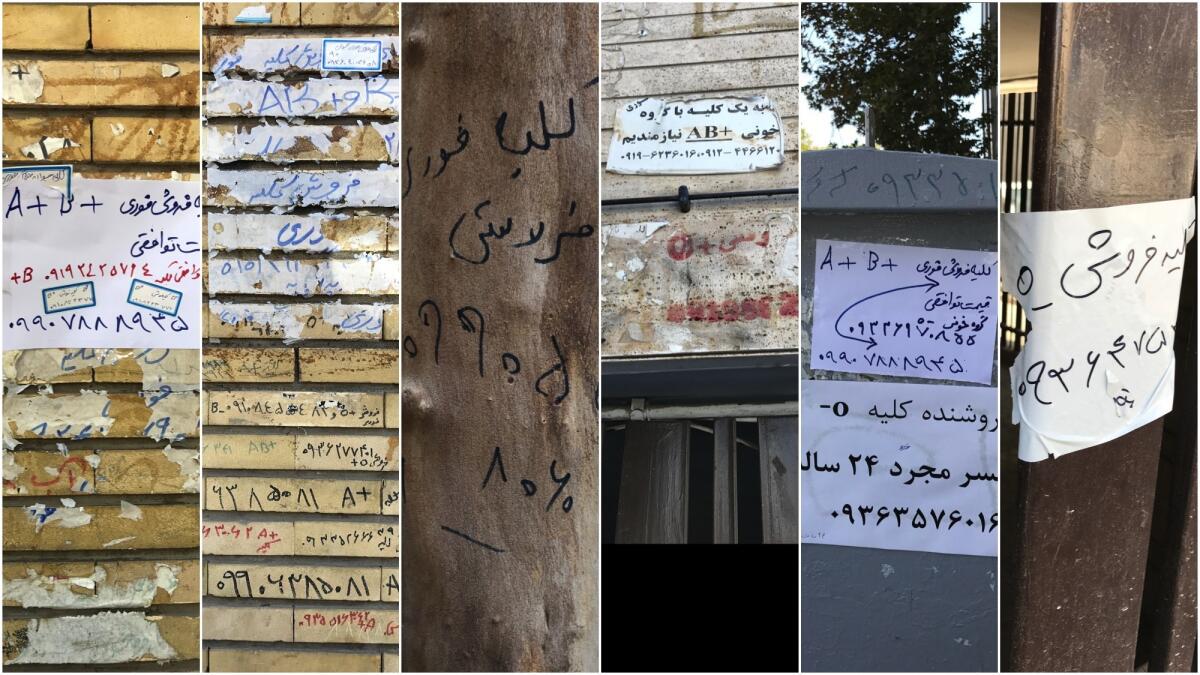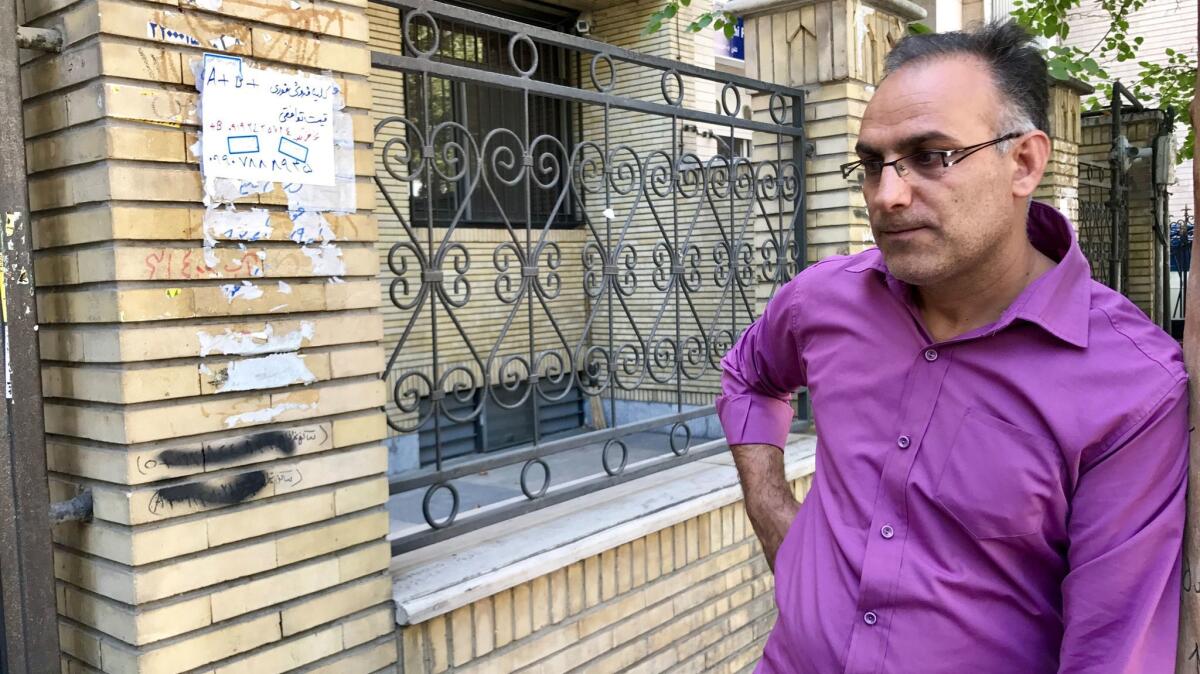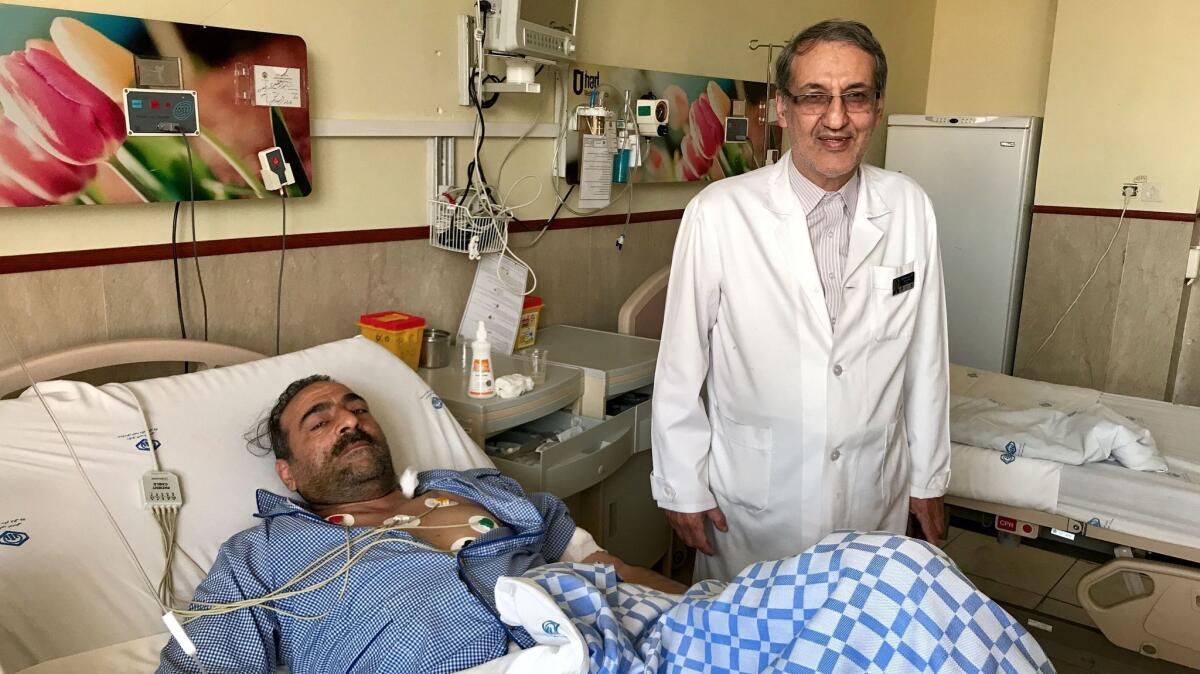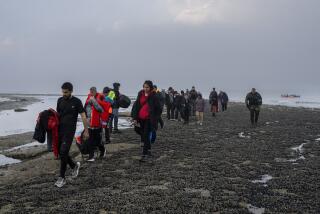‘Kidney for sale’: Iran has a legal market for the organs, but the system doesn’t always work

- Share via
Reporting from TEHRAN — The advertisements are scrawled in marker on brick walls and tree trunks, and affixed to telephone utility boxes, sidewalks and a road sign pointing the way to one of Iran’s leading hospitals.
“Kidney for sale,” read the dozens of messages, accompanied by phone numbers and blood types, splashed along a tree-lined street opposite the Hasheminejad Kidney Center in Tehran.
New ads appear almost daily. Behind each is a tale of individual woe — joblessness, debt, a family emergency — in a country beset by economic despair.
“If I could sell my kidney, I could get out of debt,” Ali Rezaei, a bankrupt 42-year-old air-conditioning installer, said in the shade of a tree across from the kidney hospital. “I would sell my liver too.”
In fact, Iran offers people a legal way to sell their kidneys — and is the only country in the world to do so. A government foundation registers buyers and sellers, matches them up and sets a fixed price of $4,600 per organ. Since 1993, doctors in Iran have performed more than 30,000 kidney transplants this way.

But the system hasn’t always worked as it’s been billed. Sellers have learned that they can cut side deals to earn up to thousands more from well-off Iranians eager to bypass the roughly yearlong wait for a transplant under the government system, or foreigners barred from the national program. In recent years, doctors have been caught attempting to perform transplants for Saudis who obtained forged Iranian IDs.
Iranian authorities say their system gives poor people a relatively safe way to make some money while saving lives, keeping surgery costs low and reducing transplant waiting times in a country where, until recently, few organs were harvested from people who died.
“Yes, people donate because they need money, but this is a reality all over the world,” said Nasser Simforoosh, chairman of the urology and kidney transplantation department at the Shahid Labbafinejad Medical Center in north Tehran.
“Instead of doing something illegal to cover their debts, like stealing or smuggling, they are saving a life first,” he said. “This is not exploitation. The end result is good for the recipient and the donor.”
But some international transplant leaders point to the advertisements as evidence that commercializing organ donations preys on the neediest people — the very thing that laws in the U.S. and elsewhere banning organ sales aim to prevent.
“The donors are not better off in the end,” said Gabriel Danovitch, director of the kidney transplant program at UCLA and a vocal opponent of organ sales. “When you are that hopeless, giving that person a lump of money while lowering their self-esteem at the same time doesn’t help them. It’s an act of desperation, not an act of love.”
If I could sell my kidney, I could get out of debt. I would sell my liver too.
— Ali Rezaei, 42
No one can say how many of the street ads are answered. But they serve as a marker of Iran’s social and economic dysfunction after years of endemic corruption, mismanagement and stifling international sanctions.
Outside the official transplant system, the rumors of a kidney black market offer tantalizing hope to victims of Iran’s troubles.
Rezaei, whose half-rimmed glasses and dress shirt give him the appearance of a white-collar salaryman, once made enough to support a middle-class life for his wife and two children. But that changed after he was hired to supply air conditioners as part of the giant Mehr public housing project, which was launched by then-President Mahmoud Ahmadinejad to build affordable apartments for low-income families.
When many of the apartments failed to sell — because of shoddy construction and accelerating inflation — some developers fled Iran, leaving their subcontractors unpaid. Rezaei owes the bank nearly $7,000 and has no way to pay it back.
He was jailed for bouncing a check, borrowed money for bail, then was rearrested three months ago for failing to pay back the loan. This time, his sister’s husband offered his own apartment as collateral to secure his release.
“My brother-in-law could lose his house,” Rezaei said. “If I go back to jail, what will happen to my kids?”
Rezaei considered signing up to sell his kidney through government channels, but his brother-in-law needed the money back immediately.
One day in late August, he wrote out his plea in thick blue letters on a sheet of printer paper and taped it to the brick wall of a medical supplies company: “Selling kidney urgently, price negotiable, AB+,” with his phone number underneath.
He wanted at least $9,000, but his plan was sketchy. He would wait for a broker to call, perhaps with an offer to smuggle him across the border into Iraq’s semiautonomous Kurdish region, where he’d heard doctors performed transplants in private clinics.
Or he would link up with an Iranian buyer and pose as a friend or relative, hoping to speed up the surgery.
Rezaei returned the next morning to ensure his ad was still there. He found that another seller had added his number to the page in red marker, and a third had attached his using small blue stickers.
Calling the numbers on the ads yields stories of heartbreak.
Mehdi, a 24-year-old biology student, needed $15,000 to solve a “family problem.” Amin, a 36-year-old truck mechanic who lost his garage to bankruptcy, would accept half that amount so he could restart his business.
One of Rezaei’s relatives, Reza Kurd, had also placed an ad on the same street. A 42-year-old smoker with swept-back gray hair and a trimmed mustache, he had lost his small poultry business and had fallen tens of thousands of dollars into debt. He sold his car and two houses and sent his wife and children to live with his mother-in-law, but still couldn’t afford the $100 monthly interest payments.
“It’s killing me,” Kurd said.
“I was outfoxed by my rivals in business and now we are being outfoxed again,” he said. “Look at the numbers of ads here. The day we place an ad on the wall, someone comes and pastes over it.”
Instead of doing something illegal to cover their debts, like stealing or smuggling, they are saving a life first. This is not exploitation.
— Nasser Simforoosh, kidney transplant doctor
Most people can live healthy lives with just one of their two kidneys. But the World Health Organization and other international bodies strongly oppose the commercialization of organ sales, arguing that it exploits sellers and leads doctors to undertake risky procedures.
This year, a Vatican conference on human organ trafficking called on all countries to recognize payments to organ donors “as crimes that should be condemned worldwide and legally prosecuted at the national and international level.”
Proponents of Iran’s system prefer the term “paid donations” to “organ sales.” Iran’s Shiite Muslim clerics have endorsed paying for kidneys as long as no harm is done to the seller.
A few years ago, domestic media reports suggested that hundreds of illicit surgeries were occurring annually, often at private hospitals and clinics for wealthy patients from Persian Gulf countries. Iranian officials said that they have since tightened procedures to ensure that only Iranians receive transplants and that surgeries take place at government hospitals.
They said that buyers and sellers undergo medical and psychological screening as well as vetting to prevent collusion or exchange of money outside the official channel.
The Kidney Foundation of Iran, the government-run agency that administers the transplant program, said recipients pay the $4,600, which the seller receives once the operation is complete. The government pays for the surgery, and the foundation or a charitable group may contribute additional costs if the recipient is needy.
“As far as we are concerned, no one can sell a kidney privately,” said Noshin Bidarigh, the foundation’s transplant coordinator. “People put up street ads out of ignorance.”
Bidarigh said that if sellers are found demanding more money, they are removed from the system and the operation is canceled.
But doctors acknowledge that it is difficult to stop side payments from occurring.
One such case involves a 78-year-old Iranian American man from Los Angeles who was undergoing dialysis treatments for kidney disease while waiting for an organ.
He had two adult children who were willing to donate, but he did not want to put them at risk, according to Danovitch, his doctor at UCLA. His other option was a kidney from somebody who just died, usually in an accident.
The average wait for those kidneys in the United States is more than 3½ years. With nearly 100,000 Americans in line, 12 die every day, according to the United Network for Organ Sharing.
So the man traveled to Tehran and, six months after registering with the Iranian foundation, received a kidney at Simforoosh’s clinic.
Danovitch said the man told him that he had paid $7,000 to a 27-year-old donor who had demanded extra money. Contacted by phone, the patient declined to discuss his surgery.
Simforoosh said that the transplant was a success, and that if the man paid additional money, he did not know about it.
“If he paid, it’s not a bad thing so long as he did it voluntarily,” Simforoosh said. “Our religious leaders have said it’s OK as long as you are saving a life.”
Doctors who oppose kidney sales say such side payments fuel the hopes of those placing street ads.
“The price is going to go higher and higher,” said Behrooz Broumand, a nephrologist and secretary of international affairs for the Iranian Society of Organ Transplantation. “Transplant commercialism is a race. As long as there is poverty, they cannot stop it.”

Even for sellers who follow the rules, things don’t always go smoothly.
One seller, wearing a black shawl and visor, walked into the kidney foundation on a recent morning to ask about her operation. The older female patient with whom she had been matched had a thyroid problem that had delayed the surgery indefinitely.
The 35-year-old divorcee, who asked to be identified only as Sarah because she had not told her family she was selling her kidney, said her problems began when she acted as a guarantor for a friend who had taken out a bank loan of about $6,000. Her friend defaulted, and Sarah, an employee at a private software company, had no way of repaying it on her monthly salary of $420.
She got the idea to sell her kidney on the internet, after searching for ways to make quick money. She placed street ads, but twice was duped by brokers who demanded she send a few hundred dollars to arrange a sale, then disappeared.
“I learned the legal way was the best way,” Sarah said.
She had decided not to ask her potential recipient, whose husband was a low-paid motorcycle courier, for money on the side. But six months after registering with the foundation, she had no idea when she would be paid, and staff members said they could not match her with another patient.
“I’m desperate,” she said. “I have to earn a living.”
Rezaei, too, was increasingly worried.
“I have five days,” he said. That was the deadline for his brother-in-law to repay the loan that bailed Rezaei out of jail. After that, the bank could seize his relative’s apartment and Rezaei could be taken back into custody.
The deadline passed. Rezaei’s ad remained stuck to the wall of the medical building, but his phone number rings with no answer.
Mostaghim is a special correspondent.
Follow @SBengali on Twitter
ALSO
Hundreds of civilians flee Islamic State-held areas of Syrian city
Trump refuses to recertify the Iran nuclear deal. What does that mean?
Relations between U.S. and Turkey grow tense, with both countries suspending routine visas
More to Read
Sign up for Essential California
The most important California stories and recommendations in your inbox every morning.
You may occasionally receive promotional content from the Los Angeles Times.











